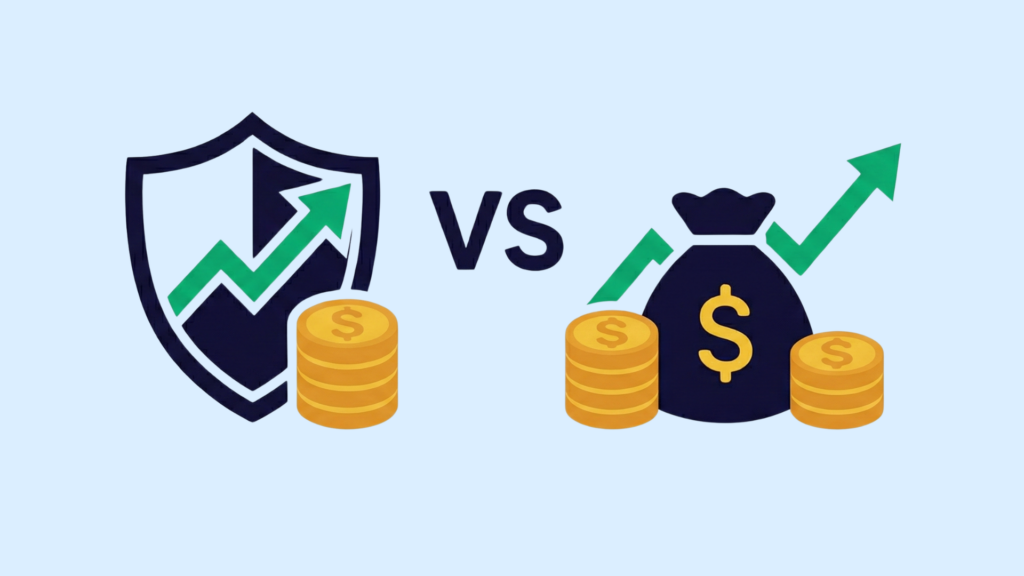Quick Summary:
Mutual funds are a great option for new investors because they provide diversification and professional guidance, making it easy to invest without having to know much about the market.
They enable minimal investments and give access to a variety of assets such as stocks and bonds, mitigating the risk per individual.
Moreover, mutual funds have advantages such as liquidity, efficiency in cost, and tax benefits, which make them convenient and versatile for different investment objectives.
What are Mutual Funds?
Mutual funds—a type of investment instrument—pool funds from many investors to create a diversified portfolio of securities. This pooling allows investors to benefit from various investments managed by professionals, even if they don’t have large amounts of money to invest individually or the time to manage investments themselves.
Here’s how mutual funds work: investors contribute money to the fund, which professional fund managers then manage. These managers decide where to invest the pooled money based on the fund’s goals and strategy. The resulting portfolio may include stocks, bonds, or other securities.
Investors receive shares or units in the mutual fund proportional to their investment. The fund’s value is reflected in its Net Asset Value (NAV) per share, which changes daily based on the fund’s performance.
Types of Mutual Funds
Understanding the different kinds of mutual funds can help you choose the right one based on your investment goals. Each type has its own investment objective and risk profile, such as:
- Equity Funds: These invest primarily in stocks. Equity funds can vary from those focusing on large, established companies (large-cap funds) to those investing in smaller, high-growth companies (small-cap funds). They suit investors looking for growth and willing to accept higher risk.
- Debt Funds invest in bonds and other debt instruments. They aim to provide steady income and are generally lower in risk than equity funds. These funds include government bond funds and corporate bond funds.
- Money Market Funds: These invest in short-term, low-risk securities like Treasury bills and commercial paper. They are designed to offer safety and liquidity, making them ideal for conservative investors or those needing short-term investments.
- Hybrid Funds: These blend investments in both stocks and bonds. Hybrid funds, such as balanced funds, seek to offer growth while managing risk through a mix of asset classes. They provide a balanced approach for investors looking for growth and stability.
What are the Advantages of Investing in Mutual Funds?
Mutual funds offer several benefits, making them a popular choice for many investors. From professional management and accessibility to transparency and cost efficiency, mutual funds provide a range of advantages that cater to different investment needs and goals.
Professional Management
When you invest in mutual funds, you gain access to professional management. Here’s how it works:
Role of Fund Managers
Fund managers are experts who make the fund’s day-to-day investment decisions. They use their knowledge and experience to research and select investments that align with the fund’s objectives.
This professional oversight means that investors benefit from informed decision-making without needing to manage their investments directly. Fund managers continuously monitor the market and adjust the portfolio to maximise returns and manage risks.
Active vs. Passive Management
Fund houses or professionals manage mutual funds in two ways:
- Actively Managed Funds: Fund managers actively make decisions to purchase and sell securities to outperform the market. These funds can potentially offer better returns but often come with higher fees.
- Passively Managed Funds: These funds aim to replicate the performance of a particular index, like the S&P 500. They usually have lower fees and are less hands-on compared to active management.
Diversification
Diversification is a key advantage of mutual funds, helping spread risk and improve stability.
Spread Risk
Mutual funds invest in various assets, such as stocks, bonds, and other securities. By spreading investments across various asset classes and sectors, mutual funds help reduce the risk of any single investment. If one investment underperforms, others in the portfolio may perform better, balancing the overall risk.
Asset Allocation
Asset allocation refers to how a mutual fund’s investments are distributed across different asset classes. This strategic distribution is crucial because it helps balance the fund’s risk and return profile. For example, a fund might allocate assets between equities for growth and bonds for income, depending on its investment goals.
Reduced Impact of Market Volatility
Diversification helps mitigate the effects of market fluctuations. By holding a broad mix of investments, mutual funds reduce the impact of downturns in any single market segment, helping to stabilise returns over time.
Liquidity
Liquidity describes how easily you can access your money in mutual funds. But how is this an advantage? Let’s find out.
Easy Redemption
Mutual funds offer easy redemption options, allowing you to sell your units and access your money relatively quickly. Most mutual funds can be redeemed on any business day, with the proceeds typically credited to your bank account within a few days. This flexibility ensures that you can get access to your funds when needed.
Daily NAV
The Net Asset Value (NAV) is the per-share value of the mutual fund, calculated daily. This daily valuation reflects the current market value of the fund’s assets minus any liabilities. NAV helps investors understand the value of their investment and provides transparency for buying and selling fund shares.
Accessibility
Mutual funds are accessible to many investors due to their affordability and flexibility.
Low Minimum Investment
Many mutual funds have low entry points, allowing investors to start with amounts as small as ₹500 or ₹1,000. This makes it feasible for individuals with varying budget sizes to invest. This low minimum requirement opens up investment opportunities to a broader audience, including those who may not initially have large sums of money to invest.
For example, a mutual fund might have a minimum investment requirement of ₹500 for a Systematic Investment Plan (SIP), allowing even those with limited funds to participate in diversified portfolios and benefit from professional management.
Systematic Investment Plans (SIP)
SIPs (Systematic Investment Plans) allow you to invest a fixed amount at set intervals, such as monthly or quarterly. This approach helps build a substantial investment over time without requiring a large initial investment.
Committing to regular investments can benefit you from rupee cost averaging, where you purchase more units when prices are low and fewer units when prices are high. This method helps mitigate market volatility and reduces the impact of market timing.
For instance, an investor might invest ₹1,000 monthly through an SIP in an equity mutual fund. Over time, these small, consistent investments can accumulate into a significant sum, benefiting from compounding growth and market exposure.
Cost Efficiency
Mutual funds offer cost benefits through economies of scale and low expense ratios.
Economies of Scale
Mutual funds aggregate many individuals’ investments, allowing them to leverage collective buying power. This reduces the cost per investor for transactions, research, and fund management.
Plus, large-scale operations help negotiate lower transaction costs and obtain better terms from service providers, which can translate into cost savings for investors.
For example, if a mutual fund manages assets worth ₹1,000 crore, the transaction costs and management fees are spread across a large pool of investors. This means individual investors benefit from reduced costs compared to managing investments independently.
Expense Ratios
The expense ratio represents the fund’s annual costs, including management fees, administrative expenses, and other operational costs. This rate is expressed as a percentage of the fund’s average assets.
A lower expense ratio means a smaller portion of your investment is used for fund management, leaving more of your money invested and potentially increasing your overall returns.
So, if a fund has an expense ratio of 0.5%, it means that for every ₹100 invested, ₹0.50 goes towards fund management expenses. A fund with a lower expense ratio leaves more of your investment working for you than a higher one.
Transparency
Mutual funds are known for their transparency, providing investors with regular updates and accurate information about their investments.
Regular Disclosures
Mutual funds provide frequent disclosures about their portfolio holdings and performance. This includes:
- Monthly or Quarterly Reports: These reports detail the fund’s investments, changes in holdings, and performance over the period.
- Annual Reports offer a comprehensive view of the fund’s performance, including financial statements and management discussions.
Performance Reports
Investors can access detailed performance reports to track their investments. These reports include:
- Historical Performance: Provides data on how the fund has performed over different time frames, such as one year, three years, or five years. This helps you gauge the fund’s track record and consistency.
- Benchmark Comparison: This shows how the fund’s performance compares to relevant market indices or benchmarks, giving you an idea of how well the fund performs relative to the market.
- Detailed Breakdown: This includes the fund’s returns, risk measures (like standard deviation and beta), and top holdings. It helps you understand the fund’s risk profile and major investment areas.
These reports help you evaluate whether the mutual fund meets your investment goals and expectations.
Tax Benefits
Investing in mutual funds can also offer significant tax advantages.
Tax Efficiency
Certain mutual funds, like Equity-Linked Savings Schemes (ELSS), provide tax benefits under Section 80C of the Income Tax Act. With these investments, you can claim tax deductions of up to ₹1.5 lakhs annually on your taxable income. Additionally, ELSS funds often offer the potential for higher returns than other tax-saving instruments like Fixed Deposits (FDs) or Public Provident Funds (PPFs).
Capital Gains Taxation
The tax treatment of gains from mutual funds depends on the holding period:
- Short-Term Capital Gains (STCG): Gains from mutual funds held for less than one year are taxed at 15%. This rate applies to equity mutual funds and can be higher for other funds.
- Long-Term Capital Gains (LTCG): Gains from mutual funds held for more than one year are taxed at 10% if they exceed ₹1 lakh in a financial year. This lower rate encourages long-term investing and can result in tax savings.
Flexibility
Mutual funds offer a high degree of flexibility, accommodating various investment needs and preferences.
Variety of Funds
Various kinds of mutual funds suit different investment goals and risk tolerances, including:
- Equity Funds invest primarily in equities (stocks), aiming for higher returns with higher risk. They are usually suitable for investors looking for long-term capital growth.
- Debt Funds Focus on bonds and other fixed-income securities, offering stability and regular income with lower risk. They are best for conservative investors seeking steady returns.
- Balanced Funds: Combine equities and debt, providing a mix of growth and income. These funds offer a good balance between risk and return.
Automatic Rebalancing
When a fund’s allocation to different asset classes deviates from its target due to market movements, the fund manager buys or sells assets to restore the original balance.
For example, suppose a fund aims for a 60% equity and 40% debt allocation and equities perform well, increasing their share. In that case, the manager will sell some equities and buy debt to maintain the balance.
This process helps manage risk and ensures that the fund’s investment strategy remains aligned with its objectives without your intervention.
Potential for Higher Returns
Mutual funds provide opportunities for potentially higher returns through broad market exposure and long-term growth.
Market Exposure
Mutual funds offer exposure to various segments of the market:
- Broad Market Exposure: Funds can invest in different sectors, industries, or geographic regions, allowing you to capture growth in various market areas. For example, an international mutual fund might invest in emerging markets with high growth potential.
- Sector-Specific Funds: Some funds focus on specific sectors, such as technology or healthcare, offering potentially high returns if those sectors perform well.
Long-Term Growth
Investing in mutual funds can lead to significant capital appreciation over time:
- Compounding Returns: Mutual funds often reinvest dividends and interest, allowing your investment to grow through compounding. Over the long term, this can result in substantial growth.
- Long-Term Investment Horizon: Equity mutual funds, in particular, can benefit from the power of compounding and market growth, making them suitable for investors with a long-term perspective.
Professional Advice and Support
Mutual funds provide access to professional advice and robust customer support, enhancing the investment experience.
Access to Expertise
Investors benefit from the expertise of professional financial advisors associated with mutual funds:
- Financial Advisors: These professionals offer guidance on selecting mutual funds, creating investment strategies, and managing portfolios. They use their expertise to help you make informed decisions.
- Fund Managers: They research and select securities, monitor the fund’s performance, and adjust as needed to meet its objectives.
Customer Service
Mutual fund providers typically offer comprehensive customer support:
- Dedicated Support Teams: Assist with account-related queries, transaction issues, and general inquiries, ensuring a smooth investment experience.
- Educational Resources: Provide tools, articles, and tutorials to help you understand mutual funds and manage your investments effectively.
The Bottom Line
Mutual funds help build a stable foundation for long-term financial growth by allowing investors to start with modest amounts and receive regular income. They also offer several advantages, such as diversification, lower risk, and access to professional management, making them a solid choice for those new to investing.
Also, the Appreciate trading app simplifies the process with its user-friendly platform for those just starting out. Offering features like ₹1 minimum investment and automated SIPs, Appreciate makes it easy for beginners to start investing in mutual funds with minimal hassle and maximum convenience.
Advantages of Mutual Funds FAQs
What are the primary benefits of investing in mutual funds?
The primary advantages of investing in mutual funds include diversification and professional management. Mutual funds spread investments across various assets to reduce risk. They are managed by experts who make informed decisions on behalf of investors.
How do mutual funds provide diversification?
Mutual funds provide diversification by pooling money from many investors to invest in a wide range of securities, such as stocks and bonds. This reduces the effect of poor performance in any investment on the overall portfolio.
What is the minimum amount needed to invest in mutual funds?
The minimum amount needed to invest in mutual funds can vary but is often as low as ₹500 for a Systematic Investment Plan (SIP). Many funds have low entry requirements, making them accessible to many investors.
How can I redeem my mutual fund investments?
To redeem mutual fund investments, you can submit a redemption request through your mutual fund provider’s website, app, or customer service. The process involves specifying the amount or number of units you wish to sell, and the proceeds will be credited to your account.
Are mutual funds suitable for beginners?
Yes, mutual funds are suitable for beginners due to their diversified nature and the professional management they offer. They provide a straightforward way to invest without requiring extensive financial knowledge or large amounts of capital.
Read more Mutual Fund Related Articles by Appreciate:























